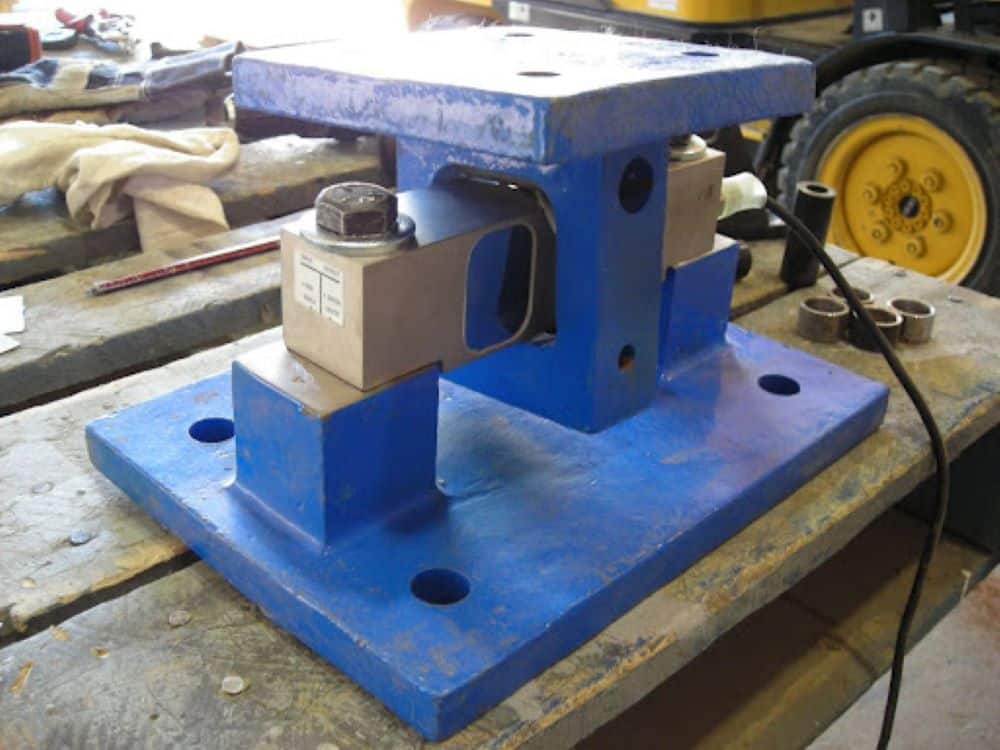
Weigh modules are integral components in industrial applications, designed to provide precise weight measurements necessary for maintaining quality and efficiency.
There are various types of weigh modules, the most common being single-end beam or dual-beam load cells, with the latter mostly used for higher capacities.
Weigh modules contribute to cost efficiency, better inventory management, reduced downtime, and improved safety. Selecting the appropriate weigh modules can be daunting, but our experts at Massload can help you navigate the options and make the best choice.
What Exactly Are Weigh Modules?
Weigh modules are essential components designed to measure weight accurately. They consist of mounting hardware and signal processing units, which are paired with a load cell and work together to convert force into accurate weight readings.
These modules are essential in various industrial applications where accurate weight measurement is essential for maintaining quality and efficiency.
Components and Basic Workings of Weigh Modules
Weigh modules typically include:
- Mounting Hardware: Ensures stable and secure installation.
- Signal Processing Units: Convert and interpret signals from the load cells.
How Do Weigh Modules Operate?
Weigh modules operate on the principle of converting force into an electrical signal. When a load is applied, the load cells within the module deform slightly, causing a change in electrical resistance. Signal processing units measure and convert this change into a weight reading.
Single-Cell vs. Multi-Cell Weigh Modules
Single-Cell Weigh Modules
- Benefits: Simple installation, cost-effective.
- Limitations: Limited to lower capacity and less redundancy.
Multi-Point Weigh Modules
- Benefits: Greater accuracy and redundancy in measurement.
- Limitations: More complex installation, higher cost.
Compression and Tension Weigh Modules
Compression Weigh Modules
Used where loads are applied from above, such as tank and hopper weighing.
- Benefits: High stability, suitable for static loads.
Tension Weigh Modules
Used where loads are applied in a pulling action, such as in suspended weighing systems.
- Benefits: High accuracy in dynamic applications, ideal for weighing suspended loads.
Where Are Weigh Modules Used?
Industrial Manufacturing / OEMs
Weigh modules are essential in industrial manufacturing and Original Equipment Manufacturing (OEM) sectors:
- Material Measurements: Guarantees precise material measurements for components, aiding in quality control and reducing material wastage.
- Assembly Lines: Integrates into production lines to ensure each product meets the exact weight specifications, improving overall product quality.
- Process Control: Provides real-time weight data to optimize manufacturing processes, enhance efficiency, and minimize downtime.
Agricultural Uses
Weigh modules enhance productivity by providing accurate weight measurements for various agricultural applications:
- Livestock: Ensures precise weight tracking for livestock health management and feed optimization.
- Crops: Accurately measures harvested crops for inventory management and sale.
- Equipment: Monitors the weight of agricultural equipment to ensure proper functioning and load capacity, preventing overloading and potential damage.
Food and Beverage Sector
In the food and beverage industry, weigh modules play a vital role in maintaining consistency and quality:
- Ingredient Measurement: Ensures accurate ingredient weights for recipes, maintaining product consistency and taste.
- Batch Processing: Facilitates precise batch processing to ensure uniform product quality.
- Packaging: Helps in accurately weighing final products for packaging, ensuring compliance with weight regulations, and reducing overfills.
Logistics and Transport
Weigh modules are extensively used in logistics and transport to improve efficiency and safety:
- Truck Scales: Accurately measures cargo weight for optimal load distribution, improving fuel efficiency and vehicle stability.
- Inventory Management: Assists in tracking the weight of goods being shipped, ensuring accurate inventory records and efficient supply chain management.
Advantages of Weigh Modules in Various Industries
Precision and Accuracy
- Food and Beverage: Maintains consistent product quality by accurately measuring ingredients.
- Industrial Manufacturing / OEMs: Guarantees precise material measurements, contributing to quality control and efficient production processes.
Operational Efficiency
- Agriculture: Enhances processing speed in grain and feed production through automated weighing systems.
- Automotive: Streamlines assembly line processes by automating weight checks for components.
- Aerospace: Speeds up the production of aircraft parts with automated weighing.
Reliability and Durability
- Mining: Withstands harsh mining environments for reliable weight measurements of extracted minerals.
- Construction: Durable enough for weighing materials like cement and aggregates.
- Oil and Gas: Resistant to extreme conditions, providing reliable measurements in drilling operations.
Versatility and Flexibility
- Logistics and Transport: Customizable weigh modules for various cargo types and sizes, ensuring optimal load distribution.
- Retail: Adaptable to different scales for checkout counters and inventory management.
- Textiles: Suitable for measuring fabrics and fibers in different production stages.
Improved Safety and Compliance
- Healthcare: Ensures medical devices and equipment meet safety standards.
- Manufacturing: Compliance with industry regulations to minimize workplace accidents and ensure safe operations.
Cost Efficiency and Waste Reduction
- Packaging: Reduces excess use of packaging materials through precise weight measurements.
- Plastics: Minimizes waste in plastic production by ensuring exact resin quantities.
- Electronics: Reduces component waste, saving costs in electronic manufacturing.
Better Inventory Management
- Warehousing: Maintains accurate stock levels by weighing incoming and outgoing goods.
- Retail: Assists in tracking inventory for restocking and sales analysis.
- Distribution Centers: Enhances inventory control and order fulfillment accuracy.
Reduced Downtime
- Manufacturing: Minimizes production halts by providing consistent weight measurements.
Increased Productivity
- Automotive: Efficient weighing processes accelerate vehicle assembly.
- Food and Beverage: Increases production speed by automating ingredient weighing.
- Textiles: Enhances production efficiency by quickly weighing raw materials.
Enhanced Traceability
- Food and Beverage: Tracks ingredient weights for quality control and regulatory compliance.
By incorporating weigh modules into these specific industries, businesses can achieve higher accuracy, efficiency, and safety, leading to significant operational improvements and cost savings.
Summing Up: Making the Right Choice
Selecting the right weigh module is crucial for enhancing your operations. By understanding the different types of weigh modules and their specific benefits, it becomes easy to make informed decisions that best suit their operational needs.
With the right weigh module, you can achieve superior accuracy, streamline your processes, and ensure compliance with industry standards.
Give Massload a call at 1.800.667.3825 or email us at contact@massload.com. We’re here to help you find the perfect solution tailored to your specific requirements.


